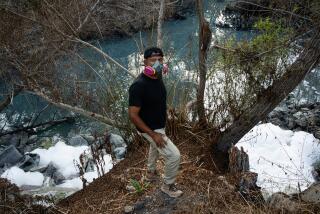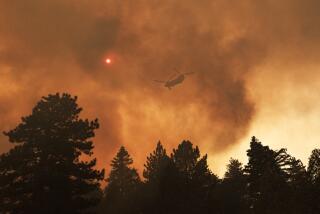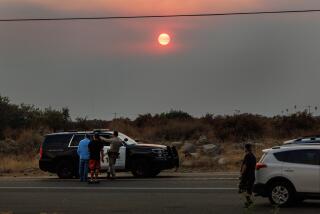Military Families Worry as Dense Smog Pollutes Gulf
The war didn’t kill Sherri Moyer’s husband--a Marine reserve captain--but she is afraid smog in the Persian Gulf will.
Moyer, and an increasing number of other families, worry about the health effects on 380,000 U.S. servicemen who are inhaling the billowing, dense, black smoke spewing from 600 burning Kuwaiti oil wells, set afire by retreating Iraqi troops.
“I’m afraid he’s going to come home a hero and die five or 10 years from now of a lung disease,” said Moyer, a Carlsbad resident. She and and other military families are raising their voices and writing letters in hopes of pressing the Pentagon to relocate servicemen beyond reach of the smoke, or to equip them with protective masks.
After more than a month of being subjected to the eye-stinging smoke that often darkens the day into night, officials are still not certain how it will affect those inhaling it.
Last week, the U.S. Environmental Protection Agency said preliminary test results showed that the air contained no “abnormal” amounts of toxic fumes. But Pentagon officials stopped short of saying the air is safe to breath, waiting for another EPA test that will be released later this month.
“The bottom line is that initial assessment detected no abnormal amounts of toxic gases, but further studies need to be done,” said Lt. Col. Stuart Wagner, a Pentagon spokesman.
But tests by other agencies suggest a more serious problem. Preliminary tests of air in Kuwait City show increases of up to 1,000% in sulfur dioxide levels from that of a year ago, said Ibrahim Hadi, director of environmental health in the Kuwait Ministry of Public Health.
Officials readily acknowledge that they are hampered by a dearth of information. A senior U.N. environmental official recently compared the burning wells to an environmental disaster on the order of Chernobyl, the meltdown of a Soviet nuclear plant.
“We have an environmental situation here that is every bit as extensive (as Chernobyl) and could have considerable impact on countries of the region. But, like Chernobyl, we don’t have any real data at the moment,” said Michael D. Gwynne, head of the U.N. Environment Program’s global environment department, at a recent news conference.
The wait for more information is a frightening one for families whose loved ones are still stationed in the Gulf area. For them, their relief at the war being over is tempered by their concern about the smog.
“We are more than a little concerned--he’s my only son,” said Janice Kern, a Glendale resident whose son, Lance Cpl. Cary Kern, is a Marine reservist assigned to Camp Pendleton.
The shooting may be over, but the danger is not, Kern said. “We feel the pollution is a lesser concern, but then you ask yourself--is it truly? Twenty years from now, is it going to be a larger concern than the war itself?”
In a recent letter, Marine reservist Thomas Halley, 20, wrote to his mother, Susan Arends of San Diego: “My main problem now is I keep getting these damn headaches.”
Arends’ husband died of lung cancer. Now she is afraid that her son, who shipped out to the Gulf on Dec. 28, will fall victim to a similar disease.
“You see all this pollution--hell, no, none of our guys are safe,” Arends said. “I’d like our guys pulled out of the area.”
The California Firefighter’s Assn. has joined Arends and other concerned family members in asking the Pentagon to move or protect U.S. servicemen.
“We feel very strongly it’s an issue that needs to be addressed,” said Eldon Nagel, the association’s general manager. “Because these fires can be of such lengthy duration, the government should take the proper steps to protect these people.”
The raging fires, which are consuming 6 million barrels of oil daily, can produce carbon monoxide and other toxic gases, according to the Firefighter’s Assn. Exposure to these gases can cause respiratory difficulties, affect the nervous system and result in permanent damage to the central nervous system, heart and lungs.
But, clearly, with so little information available, no one is quite certain what effects--if any--will result from inhaling the black smog. Other experts say the burning oil will have no adverse affects on those stationed for several months in the area.
Firefighters face more serious hazards on their jobs than do the U.S. servicemen, said Robert Phalen, director of the Air Pollution Health Effects Laboratory at the University of California, Irvine.
Although a firefighter encounters different types of smokes, some resulting from melting plastic and others from chemicals, the servicemen are inhaling smoke from a relatively “clean” oil, Phalen said. “Basically, an oil fire will produce smoke similar to diesel exhaust,” he said.
Although a small percentage of servicemen may find they are sensitive to the smoke, the majority will be able to cope with it, he said.
“I don’t think families of people over there have to worry that the oil smoke is going to do permanent damage,” he said. “They don’t have to worry about something for years down the line that will haunt these people. It’s not the type of smoke that will collect in the body and produce cancer or health effects later on.”
More to Read
Sign up for Essential California
The most important California stories and recommendations in your inbox every morning.
You may occasionally receive promotional content from the Los Angeles Times.










